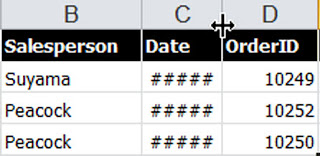100 Computer Tips in 100 Days
Tip #46 - Excel AutoFit Column Width
When you begin an Excel spreadsheet, all of the columns
and rows start out the same default width and height. The default column width
is 8.11 characters or 80 pixels. The default row height is about 14.4 characters
or 24 pixels (it varies by version). As long as the information you put in the
columns and rows fit in those constraints you are golden. Unfortunately the
world isn't that organized and you will probably need to change the column and
row sizes. That’s where Autofit comes in.
 I recommend you input a row or two of information before
you change the column width. This will give Excel some idea about the type of
information you plan on putting in the columns and rows and enable you to use
the AutoFit feature. The rows and columns will be resized to the widest/tallest
entry in the column/row.
I recommend you input a row or two of information before
you change the column width. This will give Excel some idea about the type of
information you plan on putting in the columns and rows and enable you to use
the AutoFit feature. The rows and columns will be resized to the widest/tallest
entry in the column/row.
You can AutoFit one column or all of the columns
depending on how many you select in the worksheet. To AutoFit one column, column
C in the example (see screen shot) place your mouse on the vertical line that
separates that column in the column heading from the column to the right, and double click the mouse. In the screen shot, column C would be
adjusted.
If you needed to AutoFit all of the columns in the
worksheet as you often need to when using imported data, you need to select the entire document. You can do this by using a
keyboard method (Ctrl + a, Command + a for Apple users) or by clicking the
select all box in the extreme upper left corner of the workbook, where the row
numbers and the column letters intersect. Once the worksheet is selected, move your
mouse on the vertical line in the column header between any two columns and
double click the mouse button.
I have noticed that sometimes Excel resists the AutoFit
double click. In those cases I select the entire document and manually drag the
column width to make it very wide, much wider than the maximum size I need. I
release the mouse button and then go back between any two columns and perform a
double click. Magically Excel now knows that you mean business and reduces the
columns to a best fit option. You might also have to double click the
horizontal line between any of the rows to reduce the height of all of the
rows.
My book, 100 Amazing Computer Tips - Shortcuts, Tricks, and Advice to Help Everyone from Novice to Professional, is available NOW at Amazon.com and Barnes & Noble in both print and ebook formats. There's also a handy link on top right side of this window.
Happy computing!
Diane
Don't forget to click the Subscribe to 100 Computer Tips in 100 Days via email link on the right side of the screen so you get email alerts when Diane adds a new post.






Hey this is really useful, I tried after reading your post and it works. This makes my work easier, thanks for sharing this useful tip.
ReplyDeleteSo glad you found this useful. It's one of those things you wouldn't know about unless someone told you. Enjoy.
Delete